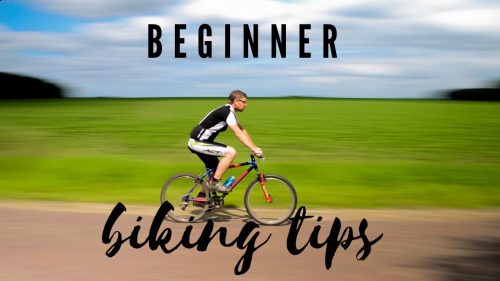Cycling is one of the most popular ways to get a proper amount of exercise each day. Some people feel like it is the best form of cardio since it is relatively low impact and allows people to explore different paths and parts of their city pretty quickly.
While some people can go out and ride a bike while feeling completely satisfied, there is a bit more to it when starting as a cycling beginner. In order to get the most out of a cycling experience, here are a few tips to keep in mind.
1. Choosing The Right Type of Bike

First off, what are you going to use your new bikie for? Are you going to use it as a commuter bike, ripping through mountain bike trails, or just use it as a gravel grinder or road smasher?
That’s the first question any bike shop should ask you is what are you intending to use the bike for and then go from there. A lot of bicycle manufacturers build bikes for any type of terrain or any type of weather so you will certainly find something suited for you!
2. Sizing is Everything!
Not all bike sizes are the same. A lot of people do not know exactly how to fit themselves for a bike, but when investing in a new set up, it just makes sense to spend the extra time to get it right.
A bike that fits is not only going to be more comfortable, but more efficient as well. People who can get the maximum efficiency out of each pedal can certainly start to see a difference.
To start out with, do some standard fitting to get a relatively good idea of the size of a bike. For saddle height, it can be found by putting the heel on the pedal and straightening leg out. Once a person is clipped in and ready to go, there will be that slight bend in the knee that is necessary to have the most comfortable position.
A similar type of bend should be in the elbows as well, so adjust the handlebars until they feel just right. Not everyone is going to have a perfect set up right away, and even veteran riders are making adjustments all the time.
Do not be afraid to do some tweaking once in a while, but it is getting the standard size so that things are close is essential. It makes absolutely no sense to invest in a bike that will not fit.
Of course, shopping for a cycling bike is the same as any type of bike when it comes to cost, looks, features, and more. Everyone will go in with a budget, so trying to find something that fits in that budget is crucial. Some of the top-end cycling bikes can rival the price of a decent car.
For beginners, something that is lightweight with a carbon fork and/or seat post is usually considered a good investment. A little bit of carbon on the bike will significantly smooth out the right, without having to spend a crazy amount of money on the bike.
3. Understand Basic Maintenance
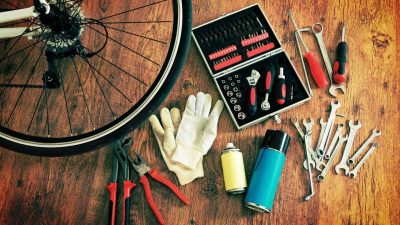
Cyclists do not have to be able to fix everything on the bike, but a few tricks of the trade are necessary. Cycling involves putting in miles and miles of riding, so there will not be an easy way to get assistance if something goes wrong.
The tires are the most likely thing to have issues, so understand the basics in proper tire care. That means checking the tire pressure before taking off, checking to see if there are any issues with the tire, and even figuring out ways to fix punctures.
Most people invest in a small air pump to fix any tire pressure issues, and a small repair kit as well. Being able to patch up a puncture can allow people to get back to safety without wasting too much time. Maybe patching things up will not last too long, but it will last long enough for people not to have to walk their bike back.
In order to carry some of the essentials, a bag that attaches to the bike, or a backpack, is necessary. It does not have to be too big, as most people want to ride as light as possible anyway, but it is something a person should invest in.
4. Proper Attire
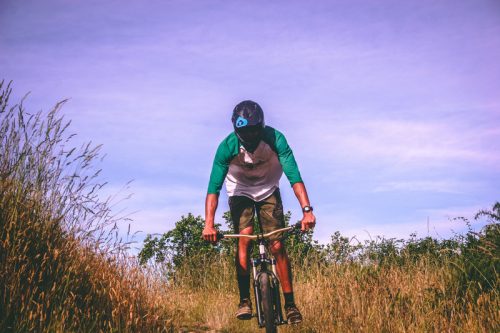
There comes the point in time with every bike rider that they invest in proper attire instead of just wearing normal workout clothes. It makes sense the more people ride, as it helps with wind resistance, comfort, and more.
The most important piece of equipment connected to attire is the helmet. Everyone should invest in a helmet that is meant for cycling, to help protect against any accidents. Having a helmet that fits correctly, offers full protection, and has no cracks in it can be a literal lifesaver.
After that, look at a shirt that fits the time of year. Some people riding in the summer need a very lightweight jersey so that they can stay as dry as possible. Remember that cycling cools people off in some ways, so if the weather is cold, it will only be colder once cutting through the air.
Cycling shorts are necessary to provide that extra bit of padding and compression for the legs. Putting miles and miles on the legs can really wear people out, and padding helps people feel comfortable in a seated position.
It might take some adjustments to get just the right seating arrangement, but the body will definitely be thankful for that effort.
Finally, shoes do make a difference. Beginners might not really see the importance of shoes at first, but they need to be lightweight and fit the bike. For those who are going clipless, the shoes need to be compatible with those clips.
Do not be afraid to bring an extra change of clothes for a longer ride. It is going to add a little bit more weight to the ride, but it comes in handy if there is a pop-up shower or anything crazy with the weather like that. Riding long distances while wet can really take a toll on some people.
5. Find Comfort in the Saddle
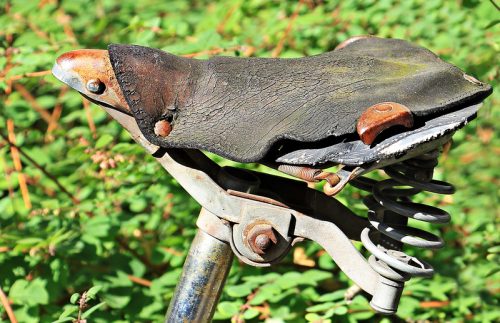
To simplify things a bit, think of riding a bike as sitting down for potentially hours at a time. If a person were to do this in the office, it would be silly for anyone to sit in an uncomfortable chair for that long.
The same can be said for sitting in an uncomfortable saddle for a long time. It makes no sense, and should be dealt with as soon as possible. There are a bunch of different ways to tweak the saddle so that it feels comfortable and it is not a nuisance in any way.
For starters, make sure that all the adjustments are made with positioning and the angle on the bike. There are a lot of easy ways to move the saddle around if a person wants to, and it can make a huge difference.
It might be something that takes a few rides to get just right, but it will definitely prove to be a good decision for longer trips.
If the saddle is still too uncomfortable, it might be time to either get a more comfortable pad, or use padding in shorts. Riders get creative with what they need to do, but ultimately, cycling is about staying comfortable and not causing any long-term issues.
If something does not feel right early on in the ride and a person is looking at hours of riding, it can lead to some severe pain and rashes later on.
6. Fuel and Hydration
Long road rides or mountain biking a single track, even for beginners, can zap a person pretty quickly. Some riders will lose thousands of calories during their ride, and they need to be replenished to continue going at a high-level.
Water is the most important thing to bring on a long ride, as staying hydrated helps replenish the loss of liquids that riders sweat out. Most people do not have any issues drinking water when it is hot, but it is still very necessary to do the same on colder rides. I find that beverages with electrolytes are far better than water when burning those calories!
For fuel, carrying protein bars or other similar options certainly helps out. They are pretty lightweight, do not need any special storage, and can provide some proper nutrients to keep going.
They are also pretty convenient to eat, without having to stop at all. This is the same type of stuff that professional riders will eat at times, so do not be afraid to incorporate them.
7. Lacking motivation? Ride in groups
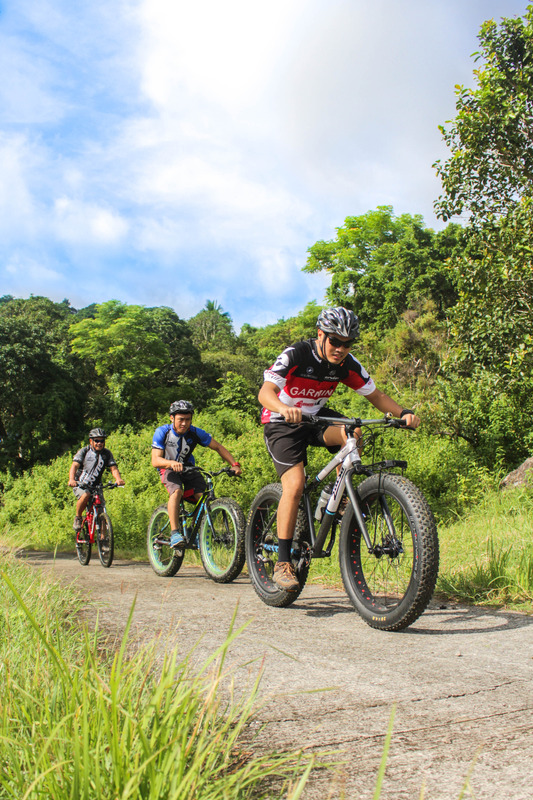
Cycling clubs are one of the best ways to get into the sport and stay as motivated as possible. There are a lot of people who might hit a wall at the beginning, but there are people out there who make writing a bit more enjoyable.
This also allows for people to have a bit more confidence instead of going out on long rides by themselves. There is less of a chance of getting lost in a group, and there are few were safety concerns as well.
One of the best things about moving into a new area is that there are so many different groups to explore simply by searching online. There might also be some postings here and there on trails that help to get the word out as well.
Since everyone who joins a cycling group is obviously sharing that interest, it can open up an opportunity to meet new friends as well. Those who are passionate about a certain sport will genuinely be curious about learning new things about new people.
8. Learn to love clipless
Anyone who wishes to take cycling seriously should heavily consider looking into riding clipless as early as possible. There are a lot of good reasons to start riding clipped in, and there is a reason why professional riders only go this way.
For starters, riding clipped in allows people to use all of their muscles in the legs to make for a more efficient type of riding. This, in turn, makes things a little easier to get through the tougher sections. There are fewer watts wasted, and it actually creates forward propulsion when pulling up with the opposite leg.
On top of that, not having to worry about feet sliding around on flat pedals is certainly a good thing. With everything locked in, it just comes down to getting the right bike adjustments and feeling comfortable at all times.
Maybe the biggest issue with going clipless is that it does take time to learn how to get out of the pedals. It involves twisting the ankle at an angle and doing so at the right time to prevent any injury. It might provide a bit of a learning curve, but it is better to start now instead of putting it off.
9. Use the Gears Provided
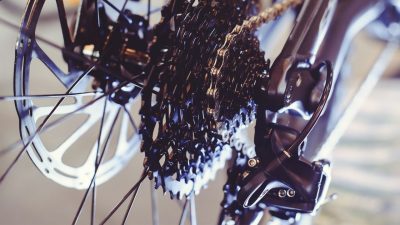
Casual riders sometimes get in the habit of being stubborn about changing their gears. It might not seem like it makes that much of a difference, but there is a reason why cycling bikes come with so many speeds in the first place. Do not be afraid to cycle through the gears and spend less time putting in a tremendous amount of effort on certain inclines.
Once a person gets more comfortable changing gears, they start to realize that starting early is a way to prevent any true discomfort. If there is a hill coming up, start changing gears before the incline starts, building up some momentum so that it is not as challenging.
Beginners might not realize just how valuable all the different gears are on a road bike. Having the ability to go just about anywhere and make adjustments quickly is crucial.
Understand what it means to change gears on the left and the right of the bike. This allows for a very smooth transition and a way to keep up with people who are riding fast.
10. Build Up to New Challenges
It is easy to fall in love with a brand new bike and try to go at a fast pace for long distances right away. If the body is not properly trained, it is going to be a bit of a struggle. Avoid burning out and build up to new challenges instead of trying to do it all in the very beginning.
This is one the best way to get injured if a person does not build up their length gradually. It also can lead to people getting frustrated with writing in general, which no one wants to have to deal with so early on in the process. The better option is to steadily increase the amount of biking each week to build up to longer goals. Eventually, people will feel like it is no big deal to go on long rides, and ride daily if that is the type of exercise they are looking for.

